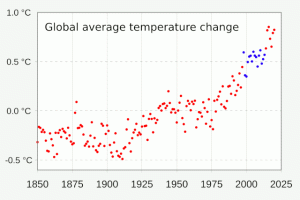Taking Years Back
Starting with one scientist, communities are now worried about how much time we truly have left. What will you do with that time?
March on April 22, 2017 for science literacy, open communication, informed public policy, and stable investment in science and research.
Five years; what if you were told you had only five more years left on this earth?
No one knows that for sure; it’s just an estimate, we should be looking after our planet under any circumstances. Starting now could prevent the worsening of climate change.
Whether you think climate change is a hoax, we should still be caring for our planet. People want a future to look forward to without worrying if the world will overheat.
At the start of April, 1,000 scientists in 26 countries protested against climate change and fossil fuels and risked the chance of arrest. The name to remember is Dr. Peter Kalmus.
Kalmus is a top scientist on climate for NASA in earth system science & engineering.
He stood on his behalf, not as a NASA member, speaking out for his concern for our planet.
“Every day that we continue to expand the fossil fuel industry and add more greenhouse gases into the atmosphere is going to lock in additional heating levels in the future,” he says.

If we don’t start now, five years could turn to five days. To lessen the stress, how can we help?
The Three R’s
The most apparent and well-known method taught to us as children is reducing, reusing, and recycling.
A simple way of cutting out waste is getting your water bottle. A reusable water bottle could reduce about 156 plastic bottles annually.
Reusing things such as plastic bags at grocery stores or switching to paper bags. Around 4 trillion plastic bags are used worldwide each year.
Making a simple change to our life could help the environment and conveniently help you simultaneously.
“Something I would like to do in my future is to get an electric car because the cars we have now are definitely a large contributor. They are just so expensive and hopefully they become more affordable over the years,” Says DHS Junior, Ian Kowalski.
Volunteer
Cleaning up in your community helps the planet and can get you out of the house!
Being involved with your community can open up new opportunities for you, which will come with benefits later on.
Community clean-ups don’t have to be something you do weekly; as long as you participate once, you’ve started something great.
Littering is a huge contributor to plastic in the ocean and picking up what you can help fight it.
Educate
The best thing we all could do is educate one another. One person changing their life won’t ultimately save the planet; it’s a collective effort.
That’s why spreading the word is the most valuable effort to put forward.
Join Local Environmental Organizations
Locally, our community has lots to offer. Different foundations of York help partake in community clean-ups and awareness.
Being a member of these organizations can teach you to be more sustainable.
These opportunities can enhance future careers, experience, and skills, along with volunteering.
Donate to Foundations
Some foundations focus on repopulating forests and helping endangered animals due to deforestation.
A small donation or sharing can help these foundations succeed in their goals.
Some of these foundations do various things, for example, A Living Tribute. You can pay $10 to have a memorial tree planted in a U.S. national forest. There are many programs; you can find them with a simple search.
Eliminating Fossil Fuels
Completely taking down big fossil fuel plants isn’t plausible for one person, but boycotting them as a community and educating the ones around us to start the change.
Overall, not supporting fossil fuels will be cheaper in the end. The biggest thing Peter Kalmus emphasized was taking down carbon industries.
Carbon and greenhouse emissions are doing the most harm to our environment.
However, these plants are complex because they get billions of dollars each year from subsidies and tax savings from large banks.
The truth is, fossil fuels will never be entirely gone. We can only reduce our reliance on them.
Small things we can do to fight every day include saving electricity (turning off lights, TVs, computers, etc…) when not being used, avoiding processed foods, using less gas, powering your home with renewable energy, and walking or biking if possible.
This is everyone’s home, in the end, we shouldn’t have to worry about when our planet won’t be able to withhold temperature rising anymore
Your donation will support the student journalists of Dallastown Area High School. Your contribution will allow us to purchase equipment and cover our annual website hosting costs.